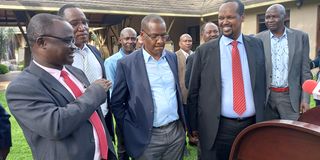Report says drought has killed half of all livestock in Asal counties

At least half of all animals in the arid and semi-arid areas (Asal) have died due to the ravaging drought situation in the country.
A report by the Asal and Disaster Management Committee shows that some pastoralists had lost their entire herds and were at risk of starvation.
Mandera Governor Ali Roba, the chairman of the committee, laying bare the consequence of the prolonged dry spell, said 50 percent of the animals in the devolved unit had died.
He called on the national government to provide fodder to the despairing herders and mitigate the effects of the drought.
“We appreciate President Uhuru Kenyatta's good gesture to intervene through the distribution of relief food,” he said.
But he noted that these efforts were still inadequate, calling upon non-governmental organisations and other development partners to scale up their response and provide support to the most affected people and livestock.
The Council of Governors, he said, will convene a consultative meeting with development partners, humanitarian organisations, the private sector and others within two weeks to discuss the worsening drought come up with ways of protecting livelihoods.
Mr Roba lauded the drafting of the Public Finance Management (Disaster Management Fund) Regulations, 2022.
He urged the National Treasury to fast-track the process and ensure that the mandate of the fund is limited to resource mobilisation and disbursement of money to entities with counties accessing not less than 50 percent of the fund.
He urged the State Department of Livestock in consultation with Asal county governments to establish a livestock marketing authority that will be given seed capital to implement component two of the Horn of Africa De-Risking
His Baringo counterpart Samuel Kiptis said his devolved unit had set aside Sh12 million to provide food to families ravaged by drought, describing the situation in some parts of the vast county as “dire”.
He, too, called on the national government to provide fodder to desperate herders.
“Some of the farmers have crossed over to neighbouring Uganda, specifically the Tororo area, in search of pasture.
He noted that the prolonged dry spell had taken a toll on animals and families, especially those who had fled their homes due to cattle rustling.
Mr Kiptis noted that Asal counties were vulnerable to climate change risks and shocks, as he urged the national government to immediately formulate an economic stimulus programme for climate change mitigation and development.
The governors were speaking in Naivasha at a meeting to share ideas on appropriate interventions.





